We watched the first half of the PBS documentary Half the Sky last night. (Quarter the Sky?) The conclusion is tonight. I highly recommend it, but not for grandchildren. Here's the trailer.
The shows will be available for one week at PBS video (maybe not in Europe, sorry). Here is the link for Part 1. I'll update with Part 2 when it is released, which should be tomorrow. And here's Part 2.
Note on flu shots: This year they're pushing the intradermal shot. Personally, I think it's because they can use a lower dose, and therefore make the supply go farther. But they're hyping it as less painful ("90% smaller needle"). No matter how many times I told him needles don't bother me ("I gave blood yesterday!"), the nurse practitioner who administered the shot kept emphasizing the small needle and consequent reduced pain.
Based on a sample size of two, I'm here to say that that is bunk. Both Porter and I agreed that the intradermal shot hurt more than a regular injection, not less. I hope our grandkids appreciate the sacrifice. :)
Last Saturday was the opening concert for the Orlando Philharmonic's 20th Anniversary season. Pausing only briefly to wonder how the "new kid on the block" can be twenty years old already—I've done that several times already, the latest being only last month, with the first of our nephews to leave the teenage years behind—I'll just say that Maestro Christopher Wilkins once again began the season with a blockbuster program guaranteed to fill the house. One work: Mahler's Third Symphony. No intermission. Nearly 110 minutes long. The first movement alone is longer than the entirety of Beethoven's Fifth. The orchestra did a great job, but I have to say that they were upstaged by the members of the Florida Opera Theatre Youth Program. Some of those kids were as young as seven, they were highly visible on a platform well above the orchestra, the part that they had to sing was brief and late in the symphony, and they did not fidget. They sat still, they kept their hand in their laps most of the time, and they at least appeared attentive. In short, they did better than me.
I was not familiar with Mahler's Third; it's not programmed often, and I can see why: the orchestra is much larger than that required for most performances, and there's a large chorus as well. E-X-P-E-N-S-I-V-E. I'm glad the OPO took the plunge to offer it. I do have to say, however, that—unlike Mahler's First, which was love at first hearing for me—this one may take a little more exposure for me to appreciate. I found most of the movements reasonably enjoyable, but the sixth and last was interminable. I don't think that had to do with the fact that we'd been sitting for so long as that to my ears it didn't seem to get anywhere. Slowly.
Still, it was a good experience, quite possibly once-in-a-lifetime. We don't even have a copy of Mahler's Third in our extensive music library, though that of course could be remedied.
I know that most of you are waiting for more important posts, with vacation pictures and grandchild adventures, but tonight you get the Blue Light Blues. I saw this article in the Hartford Courant while on vacation; the link here is to Harvard Health Publications, but it's the same text.
In case you needed one more thing to worry about, all that after-hours screen time is exposing you to excessive blue light. And blue light at night is bad.
At night, light throws the body's biological clock—the circadian rhythm—out of whack. Sleep suffers. Worse, research shows that it may contribute to the causation of cancer, diabetes, heart disease, and obesity.
But not all colors of light have the same effect. Blue wavelengths—which are beneficial during daylight hours because they boost attention, reaction times, and mood—seem to be the most disruptive at night. And the proliferation of electronics with screens, as well as energy-efficient lighting, is increasing our exposure to blue wavelengths, especially after sundown.
Did you catch the bit about energy-efficient lighting? Those highly-touted compact fluorescent bulbs and LED lights put out more blue light than incandescent bulbs. Being green can make you blue, too.
The article offers some suggestions for reducing blue light exposure:
- Use dim red lights for night lights. Red light has the least power to shift circadian rhythm and suppress melatonin.
- Avoid looking at bright screens beginning two to three hours before bed.
- If you work a night shift or use a lot of electronic devices at night, consider wearing blue-blocking glasses.
- Expose yourself to lots of bright light during the day, which will boost your ability to sleep at night, as well as your mood and alertness during daylight.
According to #1, I need to stay up for at least another two hours, but that's not going to happen. I'll try to do better tomorrow. For now, I'll go to bed feeling happy that my bedside clock has a red display.
They say a pound a week is a pretty good rate of weight loss, but today I lost a pound in six minutes.
Unfortunately, I've gained it all back by now, since the people who took my blood encouraged me to drink a lot tonight.
Did I say six minutes? That's all it took from needle-in to needle-out. However, from home to home was over two hours. At the first bloodmobile I tried, the computer went down. After waiting 45 minutes or so, with no progress in sight, I took my paperwork and drove to another site.
It seems there's always something they don't like about my paperwork, and this time it was my travel—never mind that at my last donation, just two months ago, this had posed no difficulty at all. (At that time, it was something entirely different.) "Exactly when, and for how many days, were you in Switzerland, Italy, Germany, and France in the past three years?" If this had been one grand European vacation, I might have had the dates readily to hand. But it was a struggle to remember, since—I'm amazed to say—I've made the trip a lot. Fortunately, the lady with veto power over my ability to donate blood lightened up once she concluded that none of those countries is, or ever has been, in the United Kingdom....
Having read The Immortal Life of Henrietta Lacks, I was acutely aware that the consent form I signed gives the blood bank pretty much unlimited rights to use my blood as they see fit, which is somewhat unsettling, I will admit.
I hadn't intended the adventure to take up most of the afternoon, but the time actually passed rather quickly, as I had brought with me Made to Stick, by the authors of Switch. Guilt-free reading time, a bottle of water, a movie ticket, and two chocolate chip cookies—and all it cost was two hours and a pint of blood. Plus I may save someone's life, which isn't a bad deal, either.
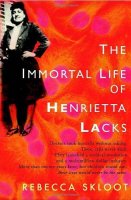 The Immortal Life of Henrietta Lacks by Rebecca Skloot (Broadway Paperbacks, 2011)
The Immortal Life of Henrietta Lacks by Rebecca Skloot (Broadway Paperbacks, 2011)
I was a kid who'd failed freshman year at the regular public high school because she never showed up. I'd transferred to an alternative school that offered dream studies instead of biology, so I was taking [a community college biology class] for high-school credit, which meant that I was sitting in a college lecture hall at sixteen with words like mitosis and kinase inhibitors flying around. I was completely lost.
But it was in that biology class that Rebecca Skloot first heard the name: Henrietta Lacks.
Henrietta died in 1951 from a vicious case of cervical cancer. ... But before she died, a surgeon took samples of her tumor and put them in a petri dish. Scientists had been striving to keep human cells alive in culture for decades, but they all eventually died. Henrietta's were different: they reproduced an entire generation every twenty-four hours, and they never stopped. They became the first immortal human cells ever grown in a laboratory.
By the mid-1970's, when I was working in the University of Rochester's Analytical Cytology Laboratory, the HeLa cell line, as it was called, had been a standard research tool for over 20 years.
[The] cells were part of research into the genes that cause cancer and those that suppress it; they helped develop drugs for treating herpes, leukemia, influenza, hemophilia, and Parkinson's disease; and they'd been used to study lactose digestion, sexually transmitted diseases, appendicitis, human longevity, mosquito mating, and the negative cellular effects of working in sewers. ... Like guinea pigs and mice, Henrietta's cells have become the standard laboratory workhorse.
"HeLa cells were one of the most important things that happened to medicine in the last hundred years," Skloot's professor told her.
What he couldn't tell her, however, was anything at all about the woman behind the cells, Henrietta Lacks herself. The quest for that information would consume much of her life, culminating in this book.
Although The Immortal Life of Henrietta Lacks has special interest for me because of my background in cervical cancer research, such inside information is hardly necessary for finding the book very difficult to put down. Skloot weaves together the story of Henrietta's famous and ubiquitous tumor cells and that of her short and difficult life in such a way that neither the science nor the sorrow becomes overwhelming. Henrietta's cells, holding an honored and essential place in modern biomedical research, contrast sharply with Henrietta's family, which could be the poster child for the poor and marginalized in our country. Reading about their lives in Clover, Virginia confirmed my conclusion that the smartest thing my great-grandparents did was to flee their own hometown on the other side of the Appalachians. Without a doubt, it was harder on Henrietta's family because they were black, but poverty, inbreeding, and, shall we say, non-traditional morals take their toll without regard to race.
The book leaves one with many questions, from medical ethics ("Will our descendants look upon those who profit from people's discarded cells—excised tumors, biopsies, blood taken for newborn testing—as we now look upon 19th century grave robbers?") to social justice ("How can we help someone whose whole community is dysfunctional?"). But I'm left with one especially pressing question, from outside of the book, as it were: How did the troubled teen that Skloot describes herself as end up an excellent and award-winning science writer? There's hope, even for the apparently dysfunctional.
Many thanks to my sister-in-law, the library book sale master, for this gem!
I'm not sure what to think of the latest buzz that sitting for more than three hours a day takes two years off your life, particularly such statements as, "Sitting, it turns out, can shorten life expectancy almost as much as smoking can." As with many such generalized studies, I think it's making its splash long before there has been sufficient time for analysis and confirmation or contradiction. Be that as it may, it's clear enough that the human body is more designed for movement than for sitting on our hind ends for extended periods.
The articles I've read about this new study recommend that we watch less television, cut down our computer time, and walk to a colleague's office rather than sending an e-mail. Only the first is at all practical for those whose work involves the computer, and whose colleagues may be half a world away. Our hope, I assume, lies in taking frequent breaks to get up and move around, although the value of such behavior may be hard to sell to an employer who is more worried about productivity than longevity.
But as long as they're considering impracticalities, I'm puzzled by the obvious omission in the articles: Not one has addressed the long hours our children spend sitting in school, with less freedom of motion than an office worker with a swivel chair and the ability to walk at will to the bathroom. When was the last time you heard a serious suggestion to keep school time to under three hours? (Besides here, of course.)
Worse still, consider what we do to our children before school: The hours tightly bound in car seats, or confined in other devices, aka baby shackles. Little time spent on their tummies learning to become mobile. Day care and early school where mobility is discouraged in the name of education or just plain crowd control.
No wonder we don't care to get off our duffs.
So, the CDC wants all of the "baby boom" generation tested for hepatitis C, in a move reminiscent of school teachers who punish the whole class for the misbehavior of the few. I was planning on simply refusing the test, should our doctor suggest it, but now I have a better answer.
The Big Red Bus was at our church today, so we hopped on and donated, after the Eucharist. (Blood in, blood out.) As it happens, testing for hepatitis C is part of the "mini-physical" you get when you donate blood. Now if the doctor asks, I can say, "been there, done that." Several times over, as a matter of fact.
Study finds coffee-drinkers live longer
The bad news? Lots of cream and sugar could negate the effect.
The good news? Enjoy your coffee guilt-free. At least the coffee helps negate the effect of the cream and sugar. :) And remember, stress and guilt are bad for you, too!
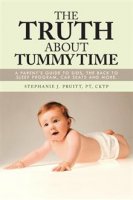 I haven't read the book myself, but was thrilled to find this review of The Truth about Tummy Time: A Parent's Guide to SIDS, the Back to Sleep Program, Car Seats and More by pediatric physical therapist Stephanie J. Pruitt. It's about time someone from the medical profession admitted that Back to Sleep has led to a significant rise in physical problems and developmental delays in our children.
I haven't read the book myself, but was thrilled to find this review of The Truth about Tummy Time: A Parent's Guide to SIDS, the Back to Sleep Program, Car Seats and More by pediatric physical therapist Stephanie J. Pruitt. It's about time someone from the medical profession admitted that Back to Sleep has led to a significant rise in physical problems and developmental delays in our children.
What I find especially interesting is that Back to Sleep is only part of the problem. See this article, Shackles for Babies, particularly the comments that follow from another pediatric physical therapist. Babies are being left on their backs during the day as well as at night, despite the known value of "tummy time." What's much worse, many are kept for hours on end in baby entertainment devices and rigid baby carriers that keep them in unnatural positions and do far more damage than leaving them on their backs, but free to move. Scary.
Even the strictest adherents of Back to Sleep can make a point of giving their babies freedom to move the rest of the hours of the day.
What's your gut reaction to this story?
There are more than 1,000 varieties of bacteria that live within the human gut, and an average person can have around 300 different varieties of the little critters living within them. Each type of bacteria not only supports one another but support your ability to digest food, stay healthy, and if your gut community is a bit off, perhaps gain weight or develop diabetes.
Or this one?
[The] often-overlooked network of neurons lining our guts that is so extensive some scientists have nicknamed it our "second brain". A deeper understanding of this mass of neural tissue, filled with important neurotransmitters, is revealing that it does much more than merely handle digestion or inflict the occasional nervous pang. The little brain in our innards, in connection with the big one in our skulls, partly determines our mental state and plays key roles in certain diseases throughout the body.
U.C.L.A.'s [Emeran] Mayer is doing work on how the trillions of bacteria in the gut "communicate" with enteric nervous system cells (which they greatly outnumber). His work with the gut's nervous system has led him to think that in coming years psychiatry will need to expand to treat the second brain in addition to the one atop the shoulders.
And from a much older source:
The eye cannot say to the hand, “I don’t need you!” And the head cannot say to the feet, “I don’t need you!” On the contrary, those parts of the body that seem to be weaker are indispensable, and the parts that we think are less honorable we treat with special honor. And the parts that are unpresentable are treated with special modesty, while our presentable parts need no special treatment. But God has put the body together, giving greater honor to the parts that lacked it, so that there should be no division in the body, but that its parts should have equal concern for each other. If one part suffers, every part suffers with it; if one part is honored, every part rejoices with it. (1 Corinthians 12:21-26)
This is a mighty sad article. The British government has issued official guidelines aimed at getting the under-five crowd moving.
The British government says children under five, including infants, should exercise every day. The guidelines recommend children under five be physically active for at least three hours per day, they also say that babies should be doing tummy time or in-swim lessons with their parents to help them gain strength.
Well, good for the British government, if it's really necessary. Is this the fruit of the back-to-sleep campaign, long rides in car seats, baby swings, strollers, bouncy seats, playpens, walkers, baby videos, and other well- and not-so-well-intentioned interventions?
All the under-fives I know (not to mention more than a few five-and-overs) have no problem whatsoever being active for three hours practically every waking minute each day. Every mother of a toddler from the creation of the world has no doubt groaned more than once, "If I could only bottle that energy...."
The British government's expressed concern is with the later risk of adult obesity, but if our toddlers must be prodded to be active, we're looking at more of a problem than that. It's nothing less than a sea change in the development of the human race.
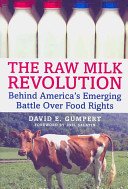 The Raw Milk Revolution: Behind America's Emerging Battle Over Food Rights, by David E. Gumpert (Chelsea Green Publishing, White River Junction, Vermont, 2009)
The Raw Milk Revolution: Behind America's Emerging Battle Over Food Rights, by David E. Gumpert (Chelsea Green Publishing, White River Junction, Vermont, 2009)
That the forward to The Raw Milk Revolution was written by Joel Salatin—whose Polyface Farms is the poster child for independent, sustainable farming—gives the reader a good idea of where the book ends up. That's a lot more than the author knew when he began his investigation. He was over 50 when he had his first glass of raw milk, and hadn't given milk of any form much thought for some 30 years.
But for a writer with interests in both small businesses and health, the growing demand for unpasteurized, unhomogenized milk—and the increasing governmental interference with the small dairy farms that are its only source—was a natural field to investigate.
I had my first glass of raw milk at lunch, with a homemade chocolate chip cookie.... Suddenly I was back in my childhood, with my all-time favorite snack. The milk was as creamy and rich tasting as it looked, with a slight sweetness I didn't recall from my childhood milk. ... But I'd be lying if I didn't admit that overhanging the experience was an anxiety-laden question provoked by my American history classes highlighting the importance of pasteurization in saving lives: Might this wonderful milk kill me? I actually went to sleep wondering whether I'd wake up. ... Of course, there was no bad reaction of any sort, and I became a regular customer.
Gumpert is lucky. The places one can legally purchase raw milk are few. In Switzerland Janet lives an easy walk from a local dairy, where she can buy all she wants at a good price. Pennsylvania is one of the few states in the U.S. where raw milk is legal, and Heather can get some for the cost of a long drive and a lot more money than the grocery store charges for their agri-business milk. In Florida we can't buy it legally at any price, except as (very expensive) pet milk, "not for human consumption." (More)
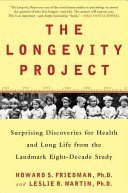 The Longevity Project: Surprising Discoveries for Health and Long Life from the Landmark Eight-Decade Study, by Howard S. Friedman and Leslie R. Martin (Hudson Street Press, New York, 2011)
The Longevity Project: Surprising Discoveries for Health and Long Life from the Landmark Eight-Decade Study, by Howard S. Friedman and Leslie R. Martin (Hudson Street Press, New York, 2011)
In the early part of the last century, Dr. Lewis Terman began a long-term study of children identified by their teachers as particularly gifted academically. Although Terman was interested in intelligence and intellectual leadership, his study left behind a great collection of sociological data, which Friedman, Martin, and their colleagues have mined for information on the factors that predispose human beings to long and productive lives.
The authors expound at length on why the data and their studies are valid, and the results applicable to most people, not just intellectual geniuses. And the results—no surprise—are much more complicated than conventional wisdom would lead one to believe. So interesting and complex are the relationships that it would be an insult to the researchers to attempt to distill their findings in a simple review. But I will note a few items of interest.
- Conventional wisdom often confuses correlation with causation. For example, although it is commonly believed that happiness promotes good health, and vice versa, the relationship is not in either direction cause-and-effect. Rather, the same underlying factors promote both happiness and health.
- The best personality predictor of longevity—as children and as adults—was what the authors call conscientiousness: people who were prudent, persistent, dependable, thrifty, detail-oriented, and responsible.
It is not only that conscientious people have better health habits and healthier brains, but also that they find their way to happier marriages, better friendships, and healthier work situations. That’s right, conscientious people create healthy long-life pathways for themselves.
-
Another key factor is social network, but as usual, it’s more complicated than simple sociability. Being an extrovert, having many friends, and abundant social activity do not presage a long life. Sociability itself, the authors say, is “a wash.” An active social life is a two-edged sword; how it cuts depends on the quality of the friends and of the activities.
Social ties, however, are critical: having a large support network is directly correlated with longer life. Interestingly, feeling loved and cared for did not improve longevity, but helping and caring for others did.
(More)
You may remember Michael Merzenich as one of the major researchers mentioned in The Brain that Changes Itself by Norman Doidge. Merzenich is no doubt a better researcher than a speaker; this lecture is not nearly as good—and certainly not as comprehensive—as the book. But it will take less than 25 minutes of your time, and is worthwhile if only for his explanation of the dangers of white noise—continuous, disorganized sound—to an infant's brain, and for the hope he holds out to those of us who grew up with the depressing idea that once you reach adulthood (or perhaps early teens, or even age six, depending on who you believe), you are basically stuck with the brain you've got.
Michael Merzenich on re-wiring the brain
(Granchild warning: I don't know if you consider "crap" objectionable, but there are a few instances between 17:00 and 18:30.)
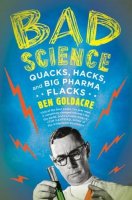
Bad Science: Quacks, Hacks, and Big Pharma Flacks, by Ben Goldacre (Faber and Faber, New York, 2010)
Bad Science was hard to read. Not because the material is difficult (it's not), nor because I disagree with the author's positions (though sometimes I do), but because it is 258 pages of sneer. Since Goldacre repeatedly states that he is bending over backwards to give his adversaries as much credit as possible, perhaps the sneer is unintentional, but it is no less an impediment. (More)
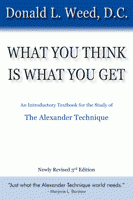
What You Think Is What You Get: An Introductory Textbook for the Study of the Alexander Technique, by Donald L. Weed (Third Edition, ITM Publications, Bristol, UK, 2004)
I wish I understood this book well enough to review it. The Wikipedia article on Alexander Technique is currently flagged, “This article may be confusing or unclear to readers.” Much the same could be said for the book, though I have to say that having read the book makes the article, if not clear, at least familiar.
What You Think Is What You Get is a keeper; it’s just not for beginners, despite the word “introductory” in the title. I would not have read very far if I had not already seen the Alexander Technique in action. However, not only do I know how much it helped Janet with her overuse injuries, but I’ve observed several classes and even had a few short lessons myself. Janet’s Alexander Technique teacher studied under Donald Weed, and her classes are nothing less than remarkable. Who would have thought that a gentle touch and the suggestion that the student relax a certain shoulder muscle would suddenly make his singing voice deeper and richer? Or that an almost imperceptible postural change would make a pianist’s music come alive? Or that being asked, “Do you really need to contract that arm muscle to help you walk across the room?” would visibly improve my walking as well as relieve arm pain I’ve had for years? (More)


